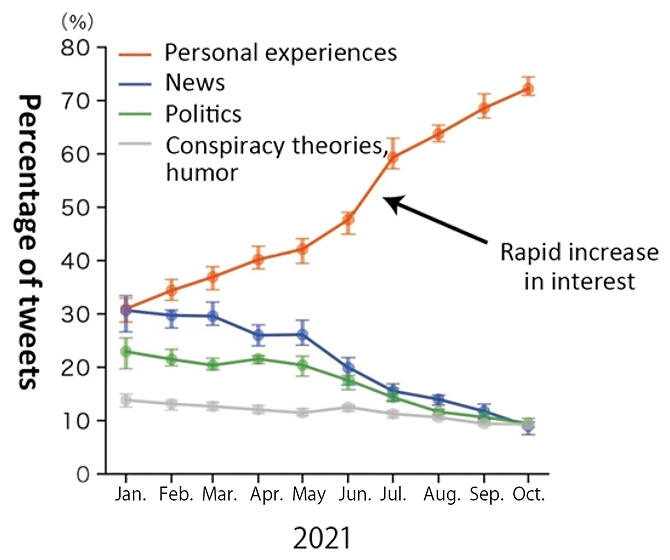Despite initial concerns about the safety and efficacy of COVID‐19 vaccines, Japan achieved a 70% vaccination rate in a shorter period than Western countries. High vaccination coverage is an effective way to control the spread of infectious diseases, as evidenced by previous cases such as measles. Therefore, monitoring public opinion about vaccination is vital to promote public health policy. Unfortunately, traditional surveys are expensive and potentially biased, as individuals tend to underreport their behaviors against social norms.
A team led by Associate Professor Ryota Kobayashi at the University of Tokyo analyzed 110 million tweets in Japanese containing the word 'vaccine' that were posted by 8 million Twitter users from January to October 2021. They used machine learning technology to categorize the tweets into 15 groups, which were then reorganized into four themes for each meaning by data science and literature researchers who carefully read typical tweets. Their analysis showed a striking shift in the tweets after the start of workplace vaccinations in June 2021. While the percentage of tweets about social topics like vaccination policies decreased, the rate of tweets about personal experiences, such as their side effects and vaccination tips, increased significantly. In October 2021, more than 70% of tweets were related to personal experiences. Additionally, this study found that the Tokyo Olympics significantly influenced the content of tweets.
This study suggests that sharing information on Twitter may help reduce anxiety about vaccination and contribute to the rapid increase in the vaccination rate in Japan. However, it is important to note that most Twitter users in Japan are in their 20s or 30s, and may not represent the views of the entire population. Despite the limitation, utilizing data from social media to observe public opinion could prove valuable for policymakers when making decisions about public health and other issues.





